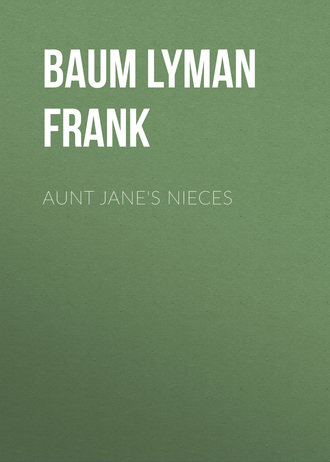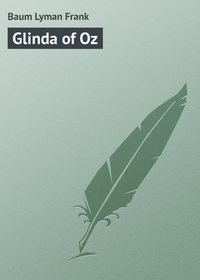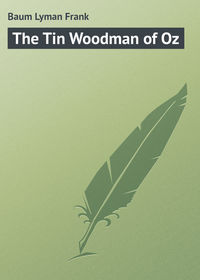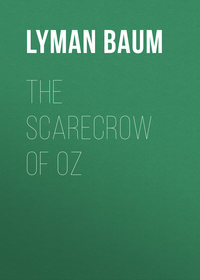 полная версия
полная версияAunt Jane's Nieces
"Poor man!" said Beth.
"After that," resumed Misery, "all that James would do was to look after the flowers. Miss Jane, after she came, made him the head gardener, and he's proved a rare good one, too. But James he won't even talk to Miss Jane, nor even to his old friend Lawyer Watson, who used to be Master Tom's special chum an' comrade. He does his duty, and obeys all Miss Jane's orders as faithful as can be; but he won't talk, an' we've all give up tryin' to make him."
"But why should I frighten him?" asked the girl.
"You tried to make him talk, and you're a stranger. Strangers always affect James that way. I remember when Miss Jane first came to Elmhurst he screamed at the sight of her; but when he found out that Master Tom loved her and had given her Elmhurst, James followed her around like a dog, and did everything she told him to. But breakfast is ready, Miss. I came to call you."
"Thank you," said Beth, turning to walk beside the housekeeper.
According to Aunt Jane's instructions the breakfast was served in her own room, and presently Louise, dressed in a light silk kimona, came in bearing her tray "to keep her cousin company," she laughingly announced.
"I should have slept an hour longer," she yawned, over her chocolate, "but old Misery – who seems rightly named – insisted on waking me, just that I might eat. Isn't this a funny establishment?"
"It's different from everything I'm used to," answered Beth, gravely; "but it seems very pleasant here, and everyone is most kind and attentive."
"Now I'll dress," said Louise, "and we'll take a long walk together, and see the place."
So it happened that Kenneth clattered down the road on the sorrel mare just a moment before the girls emerged from the house, and while he was riding off his indignation at their presence at Elmhurst, they were doing just what his horrified imagination had depicted – that is, penetrating to all parts of the grounds, to every nook in the spacious old gardens and even to the stables, where Beth endeavored to make a friend of old Donald the coachman.
However, the gray-whiskered Scotsman was not to be taken by storm, even by a pretty face. His loyalty to "the boy" induced him to be wary in associating with these strange "young females" and although he welcomed them to the stable with glum civility he withheld his opinion of them until he should know them better.
In their rambles the girls found Kenneth's own stair, and were sitting upon it when Phibbs came to summon Louise to attend upon Aunt Jane.
She obeyed with alacrity, for she wished to know more of the queer relative whose guest she had become.
"Sit down," said Aunt Jane, very graciously, as the girl entered.
Louise leaned over the chair, kissed her and patted her cheek affectionately, and then shook up the pillows to make them more comfortable.
"I want you to talk to me," announced Aunt Jane, "and to tell me something of the city and the society in which you live. I've been so long dead to the world that I've lost track of people and things."
"Let me dress your hair at the same time," said Louise, pleadingly.
"It looks really frowsy, and I can talk while I work."
"I can't lift my left hand," said the invalid, flushing, "and Phibbs is a stupid ass."
"Never mind, I can make it look beautiful in half a jiffy," said the girl, standing behind the chair and drawing deftly the hairpins from Aunt Jane's scanty grey locks, "and you can't imagine how it pleases me to fuss over anyone."
It was surprising how meekly Aunt Jane submitted to this ordeal, but she plied the girl with many shrewd questions and Louise, busily working in a position where the old woman could not see her face, never hesitated for an answer. She knew all the recent gossip of fashionable society, and retailed it glibly. She had met this celebrity at a ball and that one at a reception, and she described them minutely, realizing that Aunt Jane would never be in a position to contradict any assertion she might choose to make.
Indeed, Aunt Jane was really startled.
"However did your mother manage to gain an entree into society?" she asked. "Your father was a poor man and of little account. I know, for he was my own brother."
"He left us a very respectable life insurance," said Louise, demurely, "and my mother had many friends who were glad to introduce us to good society when we were able to afford such a luxury. Father died twelve years ago, you know, and for several years, while I was at school, mother lived very quietly. Then she decided it was time I made my debut, but for the last season we have been rather gay, I admit."
"Are you rich?" asked Aunt Jane, sharply.
"Mercy, no!" laughed Louise, who had finished her work and now sat her aunt's feet. "But we have enough for our requirements, and that makes us feel quite independent. By the way, auntie, I want to return that check you sent me. It was awfully good and generous of you, but I didn't need it, you know, and so I want you to take it back."
She drew the slip of paper from her pocket and pressed it into Aunt
Jane's hand.
"It's quite enough for you to give me this nice treat in the country," resumed the girl, calmly. "The change from the city will do me a world of good, and as I wanted to be quiet, and rest I declined all my other invitations for the summer to accept yours. Isn't it glorious that we can get acquainted at last? And I quite love Elmhurst, already!"
Aunt Jane was equally surprised and gratified. The return of the check for a hundred dollars was very pleasant. She had drawn a similar check for each of her three nieces, believing that it would be necessary for her to meet their expenses, and she had considered the expenditure in the nature of a business transaction. But Patricia had flung one check in her face, practically, and now Louise had voluntarily returned another, because she did not need the money. Really, Jane Merrick was accomplishing her purpose for less money than she had expected, and she had hoarded her wealth for so many years that she disliked to spend any of it foolishly.
Louise had read her nature correctly. It had been a little hard to return so large a check, but the girl's policy was not to appear before Aunt Jane as a poor relation, but rather as a young lady fitted by social education and position to become a gracious mistress of Elmhurst. This she believed would give her a powerful advantage over all competitors.
Whether she was right or not in this surmise it is certain that she rose several points in Aunt Jane's estimation during this interview, and when she was dismissed it was so graciously that she told herself the money her little plot had cost had been well expended.
Afterward Elizabeth was summoned to attend her aunt.
"I want to be amused. Can you read aloud?" said the invalid.
"Not very well, I'm afraid. But I'll be glad to try," answered Beth.
"What do you like?"
"Select your own book," said Aunt Jane, pointing to a heap of volumes beside her.
The girl hesitated. Louise would doubtless have chosen a romance, or some light tale sure to interest for the hour, and so amuse the old lady. But Beth erroneously judged that the aged and infirm love sober and scholarly books, and picked out a treatise that proved ineffably dull and tedious.
Aunt Jane sniffed, and then smiled slyly and proceeded to settle herself for a nap. If the girl was a fool, let her be properly punished.
Beth read for an hour, uncertain whether her aunt were intensely interested or really asleep. At the end of that dreadful period old Misery entered and aroused the sleeper without ceremony.
"What's the matter?" asked Aunt Jane, querrulously, for she resented being disturbed.
"There's a man to see you, Miss."
"Send him about his business!"
"But – "
"I won't see him, I tell you!"
"But he says he's your brother, Miss."
"Who?"
"Your brother."
Miss Jane stared as if bewildered.
"Your brother John, Miss."
The invalid sank back upon her cushions with a sigh of resignation.
"I thought he was dead, long ago; but if he's alive I suppose I'll have to see him," she said. "Elizabeth, leave the room. Misery, send the man here!"
CHAPTER XII.
UNCLE JOHN GETS ACQUAINTED
Beth went out to find Louise, and discovered her standing near the stables, where a boy was rubbing down the sides of a sorrel mare with wisps of straw.
"Something has happened," she said to Louise in a troubled voice.
"What?"
"A man has arrived who says he is Aunt Jane's brother."
"Impossible! Have you seen him?"
"No; he says he's Aunt Jane's brother John."
"Oh; I know. The peddler, or tinker, or something or other who disappeared years ago. But it doesn't matter."
"It may matter a good deal," said practical Beth. "Aunt Jane may leave him her money."
"Why, he's older than she is. I've heard mother say he was the eldest of the family. Aunt Jane wont leave her money to an old man, you may be sure."
Beth felt a little reassured at this, and stood for a moment beside Louise watching the boy. Presently Oscar came to him, and after touching his hat respectfully took the mare and led her into the stable. The boy turned away, with his hands in his pockets, and strolled up a path, unaware that the two dreaded girls had been observing him.
"I wonder who that is," said Beth.
"We'll find out," returned Louise. "I took him for a stable boy, at first. But Oscar seemed to treat him as a superior."
She walked into the stable, followed by her cousin, and found the groom tying the mare.
"Who was the young man?" she asked.
"Which young man, Miss?"
"The one who has just arrived with the horse."
"Oh; that's Master Kenneth, Miss," answered Oscar, with a grin.
"Where did he come from?"
"Master Kenneth? Why, he lives here."
"At the house?"
"Yes, Miss."
"Who is he?"
"Master Tom's nephew – he as used to own Elmhurst, you know."
"Mr. Thomas Bradley?"
"The same, Miss."
"Ah. How long has Master Kenneth lived here?"
"A good many years. I can't just remember how long."
"Thank you, Oscar."
The girls walked away, and when they were alone Louise remarked:
"Here is a more surprising discovery than Uncle John, Beth. The boy has a better right than any of us to inherit Elmhurst."
"Then why did Aunt Jane send for us?"
"It's a mystery, dear. Let us try to solve it."
"Come; we'll ask the housekeeper," said Beth. "I'm sure old Misery will tell us all we want to know."
So they returned to the house and, with little difficulty, found the old housekeeper.
"Master Kenneth?" she exclaimed. "Why, he's just Master Tom's nephew, that's all."
"Is this his home?" asked Beth.
"All the home he's got, my dear. His father and mother are both dead, and Miss Jane took him to care for just because she thought Master Tom would 'a' liked it."
"Is she fond of him?" enquired Louise.
"Fond of the boy? Why, Miss Jane just hates him, for a fact. She won't even see him, or have him near her. So he keeps to his little room in the left wing, and eats and sleeps there."
"It's strange," remarked Beth, thoughtfully. "Isn't he a nice boy?"
"We're all very fond of Master Kenneth," replied the housekeeper, simply. "But I'll admit he's a queer lad, and has a bad temper. It may be due to his lack of bringin' up, you know; for he just runs wild, and old Mr. Chase, who comes from the village to tutor him, is a poor lot, and lets the boy do as he pleases. For that reason he won't study, and he won't work, and I'm sure I don't know whatever will become of him, when Miss Jane dies."
"Thank you," said Beth, much relieved, and the girls walked away with lighter hearts.
"There's no danger in that quarter, after all," said Louise, gaily.
"The boy is a mere hanger-on. You see, Aunt Jane's old sweetheart,
Thomas Bradley, left everything to her when he died, and she can do as she likes with it."
After luncheon, which they ate alone and unattended save by the maid Susan, who was old Misery's daughter, the girls walked away to the rose arbor, where Beth declared they could read or sew quite undisturbed.
But sitting upon the bench they found a little old man, his legs extended, his hands thrust deep into his pockets, and a look of calm meditation upon his round and placid face. Between his teeth was a black brier pipe, which he puffed lazily.
Beth was for drawing back, but Louise took her arm and drew her forward.
"Isn't this Uncle John?" she asked.
The little man turned his eyes upon them, withdrew his hands from his pockets and his pipe from his mouth, and then bowed profoundly.
"If you are my nieces, then I am Uncle John," he said, affably. "Sit down, my dears, and let us get acquainted."
Louise smiled, and her rapid survey took in the man's crumpled and somewhat soiled shirt-front, the frayed black necktie that seemed to have done years of faithful service, and the thick and dusty cow-hide boots. His clothing was old and much worn, and the thought crossed her mind that Oscar the groom was far neater in appearance than this newly-found relative.
Beth merely noticed that Uncle John was neither dignified nor imposing in appearance. She sat down beside him – leaving a wide space between them – with a feeling of disappointment that he was "like all the rest of the Merricks."
"You have just arrived, we hear," remarked Louise.
"Yes. Walked up from the station this forenoon," said Uncle John.
"Come to see Jane, you know, but hadn't any idea I'd find two nieces.
Hadn't any idea I possessed two nieces, to be honest about it."
"I believe you have three," said Louise, in an, amused tone.
"Three? Who's the other?"
"Why, Patricia Doyle."
"Doyle? Doyle? Don't remember the name."
"I believe your sister Violet married a man named Doyle."
"So she did. Captain Doyle – or Major Doyle – or some such fellow. But what is your name?"
"I am Louise Merrick, your brother Will's daughter."
"Oh! And you?" turning to Beth.
"My mother was Julia Merrick," said Beth, not very graciously. "She married Professor DeGraf. I am Elizabeth DeGraf."
"Yes, yes," observed Uncle John, nodding his head. "I remember Julia very well, as a girl. She used to put on a lot of airs, and jaw father because he wouldn't have the old top-buggy painted every spring. Same now as ever, I s'pose?"
Beth did not reply.
"And Will's dead, and out of his troubles, I hope," continued Uncle John, reflectively. "He wrote me once that his wife had nearly driven him crazy. Perhaps she murdered him in his sleep – eh, Louise?"
"Sir," said Louise, much offended, "you are speaking of my mother."
"Ah, yes. It's the same one your father spoke of," he answered, unmoved. "But that's neither here nor there. The fact is, I've found two nieces," looking shrewdly from one face into the other, "and I seem to be in luck, for you're quite pretty and ladylike, my dears."
"Thank you," said Louise, rather coldly. "You're a competent judge, sir, I suppose."
"Tolerable," he responded, with a chuckle. "So good a judge that I've kep' single all my life."
"Where did you come from?" asked the girl.
"From out on the coast," tossing his grizzled head toward the west.
"What brought you back here, after all these years?"
"Family affection, I guess. Wanted to find out what folks yet belonged to me."
An awkward silence followed this, during which Uncle John relighted his pipe and Beth sat in moody silence. Louise drew a pattern in the gravel with the end of her parasol. This new uncle, she reflected, might become an intolerable bore, if she encouraged his frank familiarity.
"Now that you are here," she said, presently, "what are you going to do?"
"Nothing, my dear."
"Have you any money?"
He looked at her with a droll expression.
"Might have expected that question, my dear," said he; "but it's rather hard to answer. If I say no, you'll be afraid I'll want to borrow a little spendin' money, now an' then; and if I say yes, you'll take me for a Rockyfeller."
"Not exactly," smiled Louise.
"Well, then, if I figure close I won't have to borrow," he responded, gravely. "And here's Jane, my sister, just rolling in wealth that she don't know what to do with. And she's invited me to stay a while. So let's call the money question settled, my dear."
Another silence ensued. Louise had satisfied her curiosity concerning her new uncle, and Beth had never had any. There was nothing more to say, and as Uncle John showed no intention of abandoning the arbored seat, it was evident they must go themselves. Louise was about to rise when the man remarked:
"Jane won't last long".
"You think not?" she asked.
"She says she's half dead a'ready, and I believe it. It's about time, you know. She's let her temper and restless disposition wear her out. Pretty soon she'll blow out, like a candle. All that worries her is to keep alive until she can decide who to leave her money to. That's why you're here, I s'pose, my dears. How do you like being on exhibition, an' goin' through your paces, like a bunch o' trotting hosses, to see which is worth the most?"
"Uncle John," said Beth, "I had hoped I would like you. But if you are going to be so very disagreeable, I'll have nothing more to do with you!"
With this she arose and marched up the path, vastly indignant, and Louise marched beside her. At the bend in the walk they glanced back, and saw Uncle John sitting upon the bench all doubled up and shaking with silent laughter.
"He's a queer old man," said Beth, flushing; "but he's impudent and half a fool."
"Don't judge hastily, Beth," replied Louise, reflectively. "I can't make up my mind, just yet, whether Uncle John is a fool or not."
"Anyhow," snapped Beth, "he's laughing at us."
"And that," said her cousin, softly, "is the strongest evidence of his sanity. Beth, my love, Aunt Jane has placed us in a most ridiculous position."
That evening at dinner they met Uncle John again, seated opposite Aunt Jane in the great dining hall. The mistress of Elmhurst always dressed for this meal and tonight she wore a rich black silk and had her invalid chair wheeled to her place at the head of the table. Uncle John had simply changed his old black necktie for a soiled white one. Otherwise his apparel was the same as before, and his stubby gray hair was in a sad state of disarray. But his round face wore a cheerful smile, nevertheless, and Aunt Jane seemed not to observe anything outre in her brother's appearance. And so the meal passed pleasantly enough.
After it was finished Uncle John strolled into the garden to smoke his pipe under the stars and Louise sang a few songs for Aunt Jane in the dimly-lit drawing room. Beth, who was a music teacher's daughter, could not sing at all.
It was some time later when John Merrick came to his sister's room to bid her good night.
"Well," she asked him, "what do you think of the girls?"
"My nieces?"
"Yes."
"During my lifetime," said the old man, "I've always noticed that girls are just girls – and nothing more. Jane, your sex is a puzzle that ain't worth the trouble solving. You're all alike, and what little I've seen of my nieces convinces me they're regulation females – no better nor worse than their kind."
"Louise seems a capable girl," declared Aunt Jane, musingly. "I didn't care much for her, at first; but she improves on acquaintance. She has been well trained by her mother, and is very ladylike and agreeable."
"She's smarter than the other one, but not so honest," said Uncle
John.
"Beth has no tact at all," replied Aunt Jane. "But then, she's younger than Louise."
"If you're trying to figure out what they are, and what they are not," returned the man, "you've got a hard job on your hands, Jane, and like as not you'll make a mistake in the end. Where's the other niece? Aren't there three of them?"
"Yes. The other's coming. Silas Watson, my lawyer, has just telegraphed from New York that he's bringing Patricia back with him."
"Had to send for her, eh?"
"Yes. She's Irish, and if I remember rightly her father is a disgraceful old reprobate, who caused poor Violet no end of worry. The girl may be like him, for she wrote me a dreadful letter, scolding me because I hadn't kept her parents supplied with money, and refusing to become my guest."
"But she's changed her mind?"
"I sent Watson after her, and he's bringing her. I wanted to see what the girl is like."
Uncle John whistled a few bars of an ancient tune.
"My advice is," he said, finally, "to let 'em draw cuts for Elmhurst. If you want to leave your money to the best o' the lot, you're as sure of striking it right that way as any other."
"Nonsense!" said Jane Merrick, sharply. "I don't want to leave my money to the best of the lot."
"No?"
"By no means. I want to leave it to the one I prefer – whether she's the best or not."
"I see. Jane, I'll repeat my former observation. Your sex is a puzzle that isn't worth solving. Good night, old girl."
"Good night, John."
CHAPTER XIII.
THE OTHER NIECE
Patricia sat down opposite her Aunt Jane. She still wore her hat and the gray wrap.
"Well, here I am," she exclaimed, with a laugh; "but whether I ought to be here or not I have my doubts."
Aunt Jane surveyed her critically.
"You're a queer little thing," she said, bluntly. "I wonder why I took so much trouble to get you."
"So do I," returned Patsy, her eyes twinkling. "You'll probably be sorry for it."
Lawyer Watson, who had remained standing, now broke in nervously.
"I explained to Miss Doyle," said he, "that you were ill, and wanted to see her. And she kindly consented to come to Elmhurst for a few days."
"You see," said Patsy, "I'd just got Daddy away on his vacation, to visit his old colonel. I've wanted him to go this three years back, but he couldn't afford it until I got a raise this Spring. He'll have a glorious old time with the colonel, and they'll fish and hunt and drink whiskey all day, and fight the war all over again every evening. So I was quite by myself when Mr. Watson came to me and wouldn't take no for his answer."
"Why did you object to come here?" asked Aunt Jane.
"Well, I didn't know you; and I didn't especially want to know you. Not that I bear grudges, understand, although you've been little of a friend to my folks these past years. But you are rich and proud – and I suspect you're a little cross, Aunt Jane – while we are poor and proud and like to live our lives in our own way."
"Are you a working girl?" enquired Miss Merrick.
"Surely," said Patsy, "and drawing a big lump of salary every Saturday night. I'm a hair-dresser, you know – and by the way, Aunt Jane, it puzzles me to find a certain kink in your hair that I thought I'd invented myself."
"Louise dressed my hair this way," said Miss Merrick, a bit stiffly.
"Your maid?"
"My niece, Louise Merrick."
Patsy whistled, and then clapped her hand over her mouth and looked grave.
"Is she here?" she asked, a moment later.
"Yes, and your other cousin, Elizabeth De Graf, is here also."
"That's just the trouble," cried Patsy, energetically. "That's why I didn't want to come, you know."
"I don't understand you, Patricia."
"Why, it's as plain as the nose on your face, even if I hadn't pumped Mr. Watson until I got the truth out of him. You want us girls here just to compare us with each other, and pick out the one you like best."
"Well?"
"The others you'll throw over, and the favorite will get your money."
"Haven't I a right to do that?" asked the invalid, in an amazed tone.
"Perhaps you have. But we may as well understand each other right now, Aunt Jane. I won't touch a penny of your money, under any circumstances."
"I don't think you will, Patricia."
The girl laughed, with a joyous, infectious merriment that was hard to resist.
"Stick to that, aunt, and there's no reason we shouldn't be friends," she said, pleasantly. "I don't mind coming to see you, for it will give me a bit of a rest and the country is beautiful just now. More than that, I believe I shall like you. You've had your own way a long time, and you've grown crochetty and harsh and disagreeable; but there are good lines around your mouth and eyes, and your nature's liable to soften and get sunny again. I'm sure I hope so. So, if you'd like me to stay a few days, I'll take off my things and make myself at home. But I'm out of the race for your money, and I'll pay my way from now on just as I have always done."









